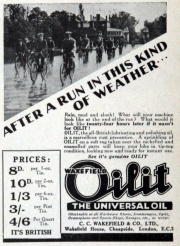C. C. Wakefield and Co































































also see Castrol: Image Gallery
of 27 Cannon Street, London E.C., manufacturer of lubricating oils.
Founded on 19 March 1899 by Charles Cheers Wakefield in London; originally named the Wakefield Oil Company.
In 1909, the company began production of a new automotive lubricant named Castrol (a contraction of Castor oil, from which it was made). The company developed specific oil applications for various applications of the new internal combustion engine, including automobiles, motorcycles, and aircraft. [1].
1910 An airship called Carbic (built by Spencer and Sons - possibly C. G. Spencer and Sons) was flown over the aero exhibition at Olympia; it was later featured on C. C. Wakefield and Co's advertisement of acetylene lighting for motorists[2].
1910 C. C. Wakefield and Co awarded a Diploma of Honour at Brussels Exhibition for railway plant and equipment[3]; also exhibited mechanical lubricator.
1910 Supplied Carbic cake, made in Yorkshire, claimed to be an improved method of packaging the ingredients for making acetylene[4]. Exhibited patented Carbic acetylene lamp at exhibition at Olympia.
1910 Floated a new public company Carbic Ltd to acquire the business of making Carbic cake, the factory at Thornhill, Yorkshire and the patent rights from C. C. Wakefield and Co[5].
1912 Advertised Wakefield Castrol lubricating oil
1913 Listed as manufacturers of lubricating oils and patentees of the Wakefield mechanical llubricator. Moved offices to Wakefield House 30 - 34 Cheapside E. C.[6]
1916 Advertised Castroleum oil (see advert)
1917 Advertised as C. C. Wakefield and Co; registered company
1919 Castrol oil used in pioneering air flights, across the Atlantic and elsewhere.
1921 Castrol oils used by T.T. race winners.
1933 Introduced mechanised service for car lubrication at Castrol Lubrequipment Services
1941 Death of Viscount Wakefield, founder of the company[7].
1944 Private placing of shares in the company
1945 Shares admitted to trading on London Stock Exchange[8].
1945 Wakefield's business was mainly in the motor trade and aircraft industry. Acquired W. B. Dick and Co, a complementary business in oils for shipping, electrical and other industries[9].
1952 Report of 35th general meeting of the company; W. B. Dick and Co was the principal subsidiary; John B. Pillin Ltd was also a subsidiary - that company was responsible for manufacture of lubricating appliances that the company sold[10].
1955 Major Cyril Dennis, director of W. B. Dick and Co which was the principal subsidiary of C. C. Wakefield and Co, retired from executive offices[11].
1956 The principal subsidiary from 1 January was Wakefield-Dick Industrial Oils Ltd. In 1957 this company had been awarded a contract to supply lubricating oil to Chapel Cross atomic power station and others under construction[12].
1957 Output of chemical additives at the Stanlow factory had increased. Edwin Cooper and Co was another subsidiary which would handle sale of surpluses to the general public[13].
1958 Wakefield-Dick Industrial Oils was a member of the Wakefield group[14]. Acquired Fletcher Miller Ltd, also involved in industrial oils[15].
1960 Name changed to Castrol Ltd. Transfer of head office to new building, Castrol House, Marylebone Road. Acquired De-corrosion services (Norwest) Ltd of Bootle which had been renamed Metal Cleaning Ltd[16].
In 1966, Castrol Ltd was acquired by British oil company Burmah, which was renamed Burmah-Castrol in 1967[17].
See Also
Sources of Information
- ↑ [1] Wikipedia
- ↑ The Times, 9 June 1910
- ↑ The Times, 15 September 1910
- ↑ The Times, 15 June 1910
- ↑ The Times, 20 October 1910
- ↑ The Engineer 1913/09/19 p 320.
- ↑ The Times, 16 January 1941
- ↑ The Times, 14 August 1945
- ↑ The Times, 16 November 1945
- ↑ The Times, Monday, Jul 07, 1952
- ↑ The Times, 30 September 1955
- ↑ The Times, 20 June 1957
- ↑ The Times, 20 June 1957
- ↑ The Times, 31 January 1958
- ↑ The Times, 25 June 1959
- ↑ The Times, 23 June 1960
- ↑ The Times, 28 October 1966

